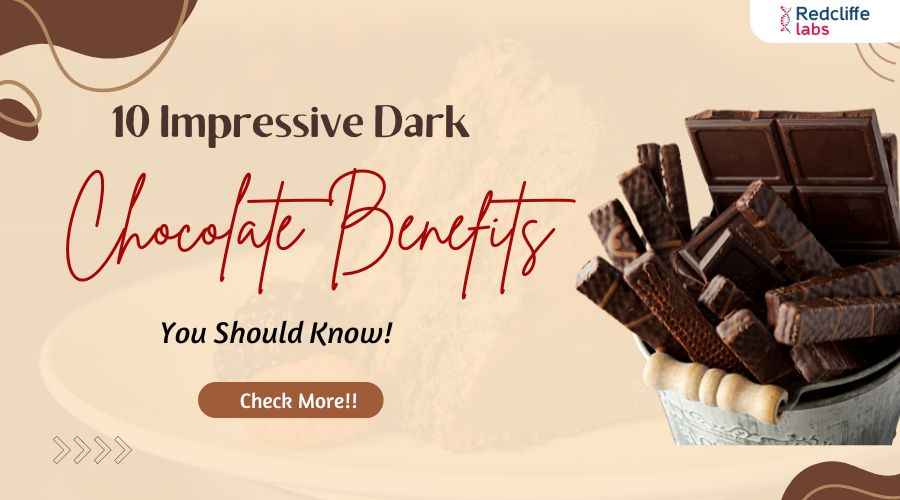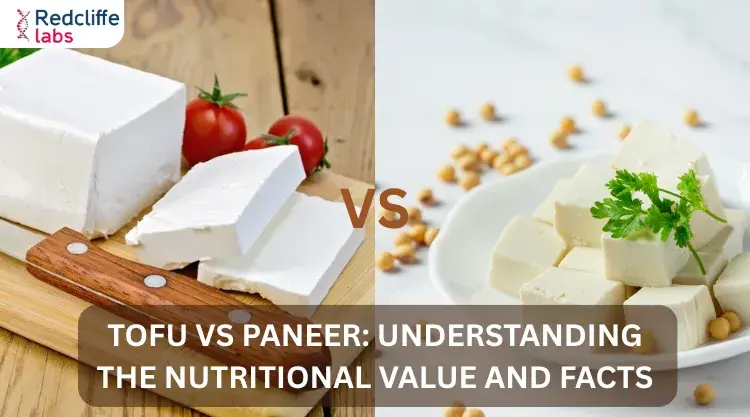10 Impressive Dark Chocolate Benefits You Should Know!

Medically Reviewed By
Prof. Ashok Rattan
Written By Muskan Taneja
on Sep 11, 2024
Last Edit Made By Muskan Taneja
on Jul 19, 2025

Cocoa is a highly concentrated powder produced from chocolate liquor. Its paste serves as an ingredient in beverages and flavorings. The composition of cocoa powder is a key ingredient in chocolate. Dark chocolate has more cocoa content in comparison to milk chocolate. The cocoa compound in dark chocolate benefits in lowering the risk of heart disease.
Do You Know?
India’s dark chocolate market is growing at 16% annually, while the milk chocolate market (a dominant one) grows at 11% annually.
Experts claim dark chocolate has better taste and quality than milk or white chocolate. Certain studies show that dark chocolate improves health and reduces the risk of heart disease. Let’s understand the 10 impressive benefits of dark chocolate.
Role of Cocoa Powder in Dark Chocolate
Cocoa powder is the principal ingredient in dark chocolate. Research claims that cocoa powder provides immense health benefits. Dark chocolate contains 50-90% cocoa solids, cocoa butter, and sugar. Some dark chocolate contains more solids, while others have artificial flavors, fats, and excessive sugars.
Cocoa solids in dark chocolate are 50-90%; in milk chocolate, the content is 10-50%; and in white chocolate, the content is 20%. A high concentration of cocoa in dark chocolate makes it taste more bitter than milk chocolate. Experts and chocolate lovers prefer high-quality dark chocolate with 75% cocoa or higher.
Nutrition Compound of Dark Chocolate
Dark chocolate differs in production quality and cocoa powder content. Here is a breakdown of its nutrition compounds.
G-grams, mg- milligrams
| Nutrition | Compound (100g with 75-85% cocoa) |
| Calcium | 73.7 mg |
| Potassium | 722 mg |
| Magnesium | 230 mg |
| Iron | 12 mg |
| Protein | 7.9 g |
| Sugar | 24.2g |
| Fiber | 11g |
| Carbohydrates | 46.4g |
| Sodium | 20.2 mg |
| Cholesterol | 3 milligrams (mg) |
| Fat | 43 grams (g) |
| Calories | 604 |
Also, read https://redcliffelabs.com/myhealth/dry-fruit/10-amazing-health-benefits-of-raisins/
Health Benefits of Dark Chocolate
Eating dark chocolate benefits overall health. Here are 10 impressive health benefits of dark chocolate.
- Protect heart health
- Improve lipid profile
- It acts as a source of antioxidants
- Improve blood flow and lower blood pressure
- Protect Low-density Lipoprotein (LDL) from oxidation
- Protect skin from sun damage
- Improve brain functioning
- It acts as an insulin resistance
- Help with gut health
- It helps lift the mood
1. Protect Heart Health
Dark chocolate contains compounds such as flavonoids that prevent the risks of major heart diseases, high blood pressure, and high cholesterol. Studies show that people with diabetes and high blood pressure have lowered their levels by consuming dark chocolate.
Another study showed that dark chocolate doesn’t increase cholesterol, reducing the risks of coronary heart disease. Almonds and dark chocolate also limit the damage.
2. Improve lipid profile
Studies claim that eating at least 2 grams of dark chocolate daily can lower cholesterol levels. It can increase HDL cholesterol and decrease LDL cholesterol. The cocoa compound improves gut health.
3. It is a Source of Antioxidants
Antioxidants prevent your body cells from damaging. Dark chocolate has polyphenols, a type of antioxidant. Some cocoa powders, such as blueberries and pomegranates, have more antioxidants than fruits.
Research shows that dark chocolate's antioxidant properties benefit overall health and prevent oxidative stress, which may lead to diseases like heart disease, cancer, eye disease, and diabetes.
4. Improved Blood flow and Lower Blood Pressure:
Dark chocolate contains a high amount of cocoa. These compounds provide antioxidants to the body that improve blood flow, eventually lowering blood pressure.
Several studies claim that dark chocolate may improve blood flow and lower blood pressure; however, the results are mild. If you have high BP, you should ask your doctor for a recommendation about consuming dark chocolate.
5. Protect Low-density Lipoprotein (LDL) from Oxidation
The cocoa compound benefits from boosting good cholesterol. Studies indicate that dark chocolate can increase good cholesterol and reduce bad cholesterol levels in the blood.
If you have high cholesterol, you can have dark chocolate in moderate amounts. However, it contains sugar and saturated fats that may negatively affect your cholesterol levels.
6. Protect Skin from Sun Damage
Dark chocolate protects skin from sun damage. Flavanols may improve blood flow and increase skin density and hydration. Studies show a minimal erythemal dose (MED) can increase after eating dark chocolate.
7. Improve Brain Functioning
Dark chocolate contains cocoa flavanols, which increase the growth of nerve cells and improve brain cell functioning. They also help improve concentration, memory power, and learning ability.
Some studies show that consuming dark chocolate may enhance oxygen levels, nerve function, and blood flow to the brain. Another study shows that dark chocolate may protect against the decline in brain functioning and certain health conditions such as dementia and Alzheimer’s. However, scientists carried out this study on rats.
8. Acts as an Insulin Resistance
Insulin resistance may increase blood sugar levels, later leading to prediabetes and type-2 diabetes. Research shows that consuming dark chocolate may lower blood sugar levels. It found that 48g of 75% dark chocolate may lower glucose levels and reduce insulin resistance.
9. Help with Gut Health
Experts say that dark chocolate has a high content of cocoa, which acts as a fuel for gut bacteria. Cocoa also aids in digestion because of its prebiotic compound. Studies show that your gut bacteria do like chocolate. Eating dark chocolate benefits as a gut booster. Remember to have good quality dark chocolate with few ingredients.
10. Helps in Lifting the Mood
Chocolate lovers believe that it may help enhance mood. Research suggests that the flavonols in dark chocolate may encourage the release of endorphins and help with mental well-being.
Cocoa also helps produce serotonin, which naturally boosts mood. Dark chocolate also benefits from lifting the mood. Studies show a strong link between chocolate and its effects.
Things To Keep In Mind Before Eating Dark Chocolate
- Caffeine Content: People who are sensitive to caffeine or who avoid it for health reasons may find that dark chocolate is not a good choice because it contains caffeine, which can disrupt sleep patterns.
- Sugar and Calories: Dark chocolate can still contain a lot of fat and calories even though it contains less sugar than milk chocolate. Moderation is essential, particularly when it comes to controlling your blood sugar or weight.
- Quality: Quality Is Important Select premium dark chocolate with at least 70% cocoa content. There are often more health benefits associated with cocoa content.
- Allergens: Certain dark chocolates are processed with dairy or nuts, so be sure to read the label for any possible allergies, especially if you have a nut or dairy sensitivity.
- Health issues: Consider your medical issues. Certain components found in dark chocolate may interact with drugs or aggravate illnesses like acid reflux.
Who Should Avoid Eating Dark Chocolate?
- People with Caffeine Sensitivity: Those with sleeplessness or other caffeine-sensitive conditions may need to restrict their dark chocolate consumption.
- Individuals suffering from gastrointestinal disorders: Due to its acidic nature, dark chocolate may worsen conditions such as irritable bowel syndrome (IBS) or acid reflux.
- Individuals who have kidney stones: Oxalates found in dark chocolate may make kidney stones more likely to develop in vulnerable individuals.
- Diabetes: People with diabetes should closely watch their intake of dark chocolate since, despite its lower sugar content, it can still have an impact on blood sugar levels
- Pregnant Women: Because too much caffeine can interfere with fetal development, pregnant women should exercise caution while using caffeine.
Does Dark Chocolate Affect Pregnancy?
Caffeine and theobromine, two ingredients in dark chocolate, can pass through the placenta. Although moderate use is thought to be safe, it's crucial to:
- Keep an eye on Your Caffeine Intake: Keep your daily caffeine intake to the recommended amounts, which are usually no more than 200–300 mg from all sources.
- Monitor Portion Measurements: Overindulging in dark chocolate might result in an intake of calories and sugar that is not recommended for pregnant women.
- Consult your Medical professional For personalized guidance, particularly if you have any issues or worries linked to pregnancy.
How Much Dark Chocolate Should You Eat In A Day?
The key is moderation. One to two ounces (30–60 grams) of dark chocolate per day is a fair quantity to enjoy its health advantages without going overboard.
Are There Any Risks of Overeating Dark Chocolate?
- Weight Gain: Because dark chocolate contains many calories, consuming it excessively might lead to calorie overload and weight gain.
- Digestive Problems: The high fat and caffeine content of overeating can cause gastrointestinal distress, including bloating or diarrhea.
- Possibility of Toxicity: Excessive doses may cause theobromine to build up and manifest as symptoms such as agitation, headaches, or nausea.
- Interaction with Medications: If you have any concerns, speak with a medical professional. Excessive use may interact with certain medications or medical conditions.
Key Takeaways
Dark chocolate is packed with flavanols that offer various health benefits. It is abundant in minerals and antioxidants and promotes heart health. Compared to milk and white chocolate, dark chocolate has less sugar. Studies show that dark chocolate reduces inflammation and improves brain function.
Dark chocolate has many benefits. However, excessive consumption may lead to weight gain, digestive issues, or the build-up of toxins in the body. So, the best amount is 30-60 grams daily. Additionally, consult a dietician or nutritionist if you have questions.



